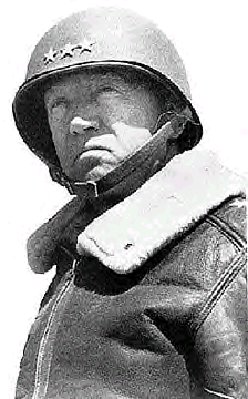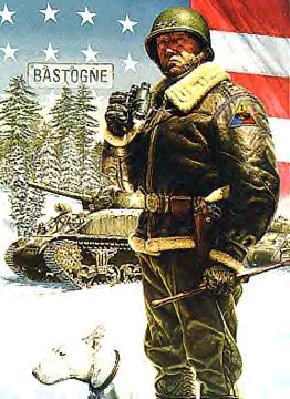U.S. MILITARY HISTORIC COMMANDERS
General George S. Patton

"Moral Courage is the most valuable and usually the most absent characteristic in men"
General George Smith Patton (1885-1945) ,commander of the U.S. 3rd Army, was one of greatest military commanders in U.S. history. He was born in San Gabriel, CA and was educated at the U.S. Military Academy at West Point. Patton was famous for his many victories in WWII in both the North African and European theaters. He began his career as a tank commander in World War I and used his expertise while fighting the dreaded Erwin Rommel in North Africa. Although General Patton was very strict and expected his men to act like disciplined soldiers, his men respected him because he always pushed on with determination until he won. After the U.S. suffered a devastating defeat at the Kasserine Pass, General Eisenhower promoted Patton to Lt. General to beat the German forces and boost U.S. morale. Patton immediately began enforcing strict military rules on his dispirited troops and ordered officers in the 2nd corps to lead their troops in battle instead of staying in the rear. Within months of taking command, Patton grouped his troops and in March 1943 began to push back the Germans from the west. In the east, General Patton’s arch-rival General Montgomery pushed the Germans back and in a combined effort, the British and Americans drove the Nazis out of North Africa. Patton and Montgomery had a grudge with each other and were always striving to be the center of attention. The conflict between the two lasted until the end of the war even though General Patton won most of the glory. He was given command of the new 7th Army in April 1943 and personally landed on the beach with his men during the invasion of Sicily. During the war, Patton was criticized for his aggressiveness and was almost relieved of duty after he slapped a soldier who he considered a coward. Fortunately, Eisenhower and Chief of Staff Marshall refused to discharge him and later put him in charge of the 3rd Army which he lead to glory in the European campaign. The Germans greatly feared General Patton and expected him to lead a great invasion wherever he went. Because of this, Patton was sent to many places around Europe such as Cairo as a diversion which tied down a great number of German troops. On the 28th of July, 1944, Patton and his 3rd Army began its spearhead across Northern France and covered 600 miles in two weeks.
